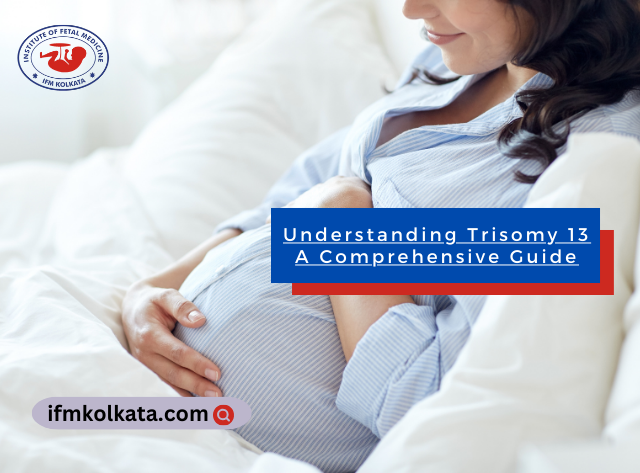Trisomy 13, also known as Patau syndrome, is a chromosomal disorder characterized by the presence of an extra copy of chromosome 13 in some or all of the body’s cells. This additional genetic material disrupts normal development and can lead to a range of congenital abnormalities and serious health issues. In this article, we will delve into the details of T – 13, including its causes, symptoms, diagnosis, management, and support options, while also highlighting the appointment booking details of the Institute of Fetal Medicine in Kolkata.
What is Trisomy 13?
Trisomy 13, a rare chromosomal disorder, results from the presence of an extra copy of chromosome 13 in some or all of the body’s cells. This additional genetic material disrupts normal development and can lead to various congenital abnormalities and health complications. This additional genetic material disrupts normal development and can lead to a range of congenital abnormalities and health complications.
Causes and Risk Factors
Trisomy 13, also known as Patau syndrome, results from the presence of an extra copy of chromosome 13 in some or all of the body’s cells. This additional genetic material disrupts the normal development of the fetus, leading to various congenital abnormalities and health complications associated with the condition.
The primary cause of Trisomy 13 is related to errors in cell division during the formation of reproductive cells or early embryo development. Spontaneous errors, not usually inherited from parents, can lead to these conditions. However, advanced maternal age is a significant risk factor for T – 13. Women who become pregnant at an older age have a higher risk of having a child with Trisomy 13 compared to younger women. Experts believe this occurs due to the increased likelihood of chromosomal abnormalities in eggs as women age.
In addition to advanced maternal age, certain genetic factors may also contribute to the development of Trisomy 13. Individuals with a family history of chromosomal abnormalities or genetic syndromes may have an increased risk of having a child with T-13. Environmental factors and lifestyle choices during pregnancy, such as exposure to toxins or certain medications, may also play a role in increasing the risk of chromosomal disorders like T – 13, although more research is needed to fully understand their impact.
Overall, while the exact causes of Trisomy 13 may vary, understanding the potential risk factors can help healthcare providers identify individuals who may be at increased risk and provide appropriate genetic counselling and prenatal screening options. Early detection and diagnosis of T – 13 are crucial for informed decision-making and ensuring the best possible outcomes for both mother and baby.
Signs and Symptoms
- Craniofacial abnormalities such as cleft lip and palate
- Heart defects
- Brain abnormalities
- Kidney problems
- Extra fingers or toes
- Severe developmental delays
Diagnosis and Screening
Trisomy 13 can be diagnosed through prenatal screening tests and confirmed through diagnostic procedures such as amniocentesis and chorionic villus sampling (CVS). Early detection is crucial for informed decision-making and appropriate management of the condition.
Management and Treatment
There is no cure for Trisomy 13, but a multidisciplinary approach to management can help address specific medical complications associated with the condition. Treatment options may include surgical interventions for heart defects and supportive care to improve quality of life.
Prognosis and Outlook : Trisomy-13
The prognosis for individuals with Trisomy 13 varies depending on the severity of their condition and the presence of associated medical complications. Infants with T – 13 often face health challenges and shorter lifespans. In severe cases, stillbirth or neonatal death may occur.
Coping and Support
Coping with a diagnosis of Trisomy 13 can be challenging for patients and their families. Emotional support resources, such as support groups, counselling services, and community organizations, can provide assistance and guidance throughout the journey.
Trisomy 13 : Making Informed Decisions
Patients and families with Trisomy 13 should make informed decisions on testing, pregnancy, and end-of-life care. They need support to navigate these choices. Respect for patient autonomy and individual choices are paramount in this process.
Research and Advances
Appointment Booking Details
To book an appointment or learn more about our services, please contact us at:
📞 9830047676 | 9748480005 | 9831788538
📧 info@ifmkolkata.com
Address: 152 Shyama Prasad Mukherjee Road, at Rashbehari crossing – near Kalighat Metro gate No. 9, Kolkata 700026.

